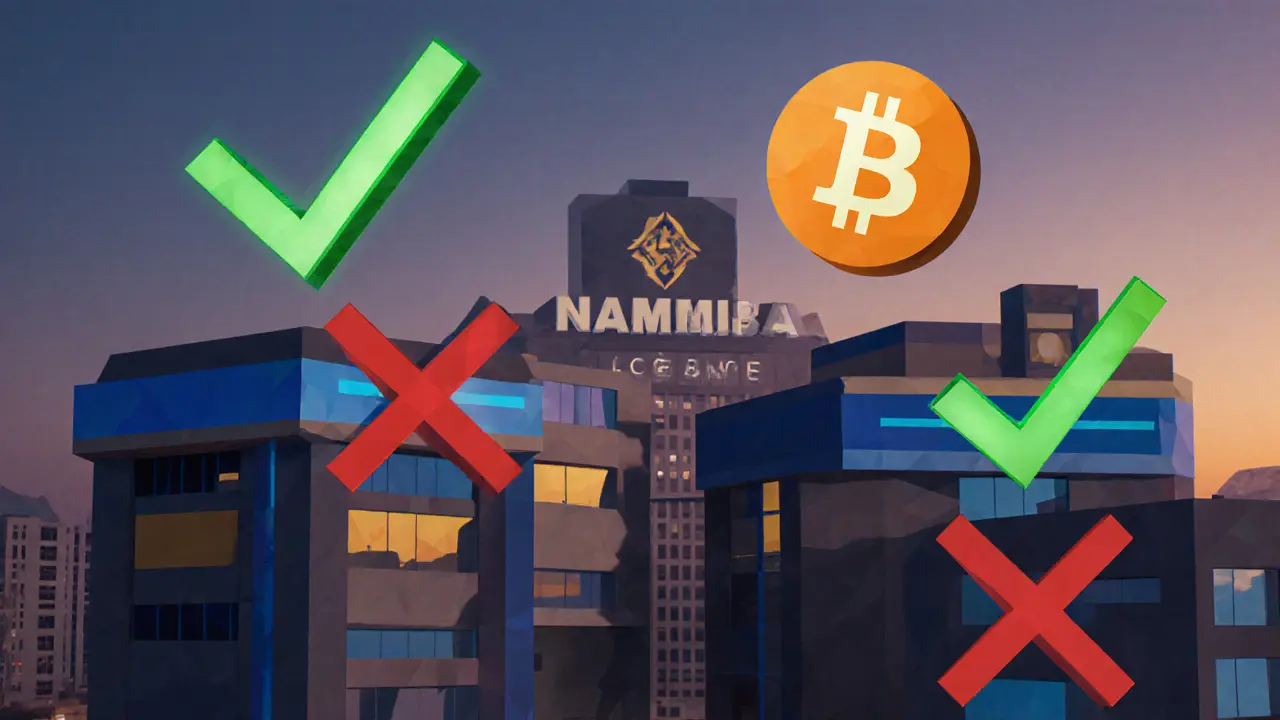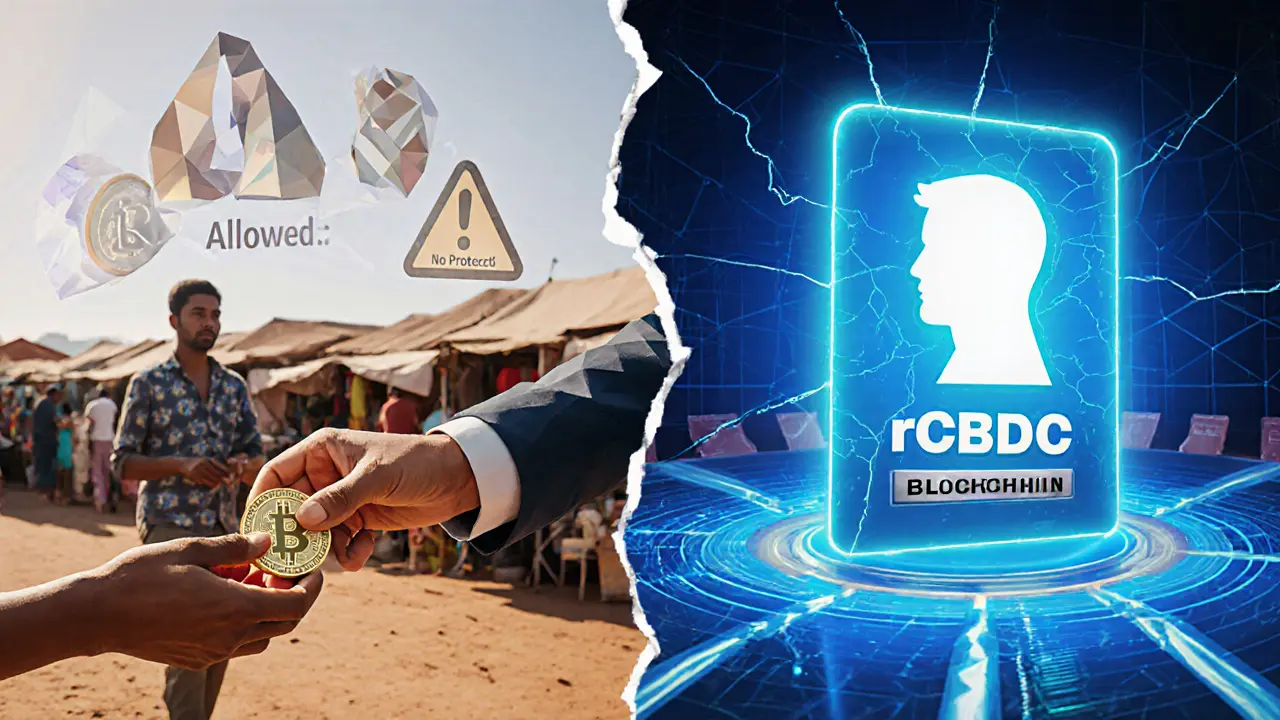Bank of Namibia Crypto Policy: What You Need to Know About Restrictions and Licensing in 2025
 Nov, 15 2025
Nov, 15 2025
Namibia Crypto License Timeline Calculator
License Timeline Calculator
Key Requirements
Provisional Authorization - 6-month regulatory sandbox period
- Cannot serve customers or advertise
- Must implement security systems
- Must hire trained staff
NO Foreign exchanges - Only Namibia-based companies can apply
NO ICO's - Not allowed under the Virtual Assets Act
NO Anonymous transactions - Must report transactions over NAD 20,000
License Timeline Results
Enter your application date and license type to see your timeline.
When you hear that a country bans cryptocurrency, you might assume it’s a total blackout - no trading, no wallets, no payments. But in Namibia, the story is more complicated. The Bank of Namibia doesn’t outright ban crypto. Instead, it’s built a system that lets you use it - if you follow very strict rules. And those rules are changing fast.
It’s Not Illegal to Use Crypto - But It’s Not Legal Either
In 2018, the Bank of Namibia made it clear: cryptocurrencies aren’t money. They’re not commodities. They’re not recognized on any financial exchange in the country. That sounded like a full stop. But by 2022, the tone shifted. The central bank said Bitcoin could be used to pay for goods - if both buyer and seller agreed. No laws were broken. No fines were issued. It was a quiet green light, tucked inside a red warning. The truth? Crypto isn’t legal tender in Namibia. That means no one has to accept it. No business is forced to take it. But if you walk into a shop and they say, “Yeah, we’ll take your Bitcoin,” that’s allowed. The Bank doesn’t stop you. It just won’t protect you if things go wrong.The Virtual Assets Act of 2023: The Real Game Changer
Everything changed in June 2023, when Namibia’s National Assembly passed the Virtual Assets Act (Act No. 10 of 2023). This wasn’t a suggestion. It was law. And it created something new: a licensing system for crypto businesses. Now, if you want to run a crypto exchange, operate a crypto ATM, or offer wallet services in Namibia, you must register with the Namibia Financial Institutions Supervisory Authority (NAMFISA). You can’t just set up a website and start taking money. You need approval. And that approval comes with heavy strings attached. The process has two stages. First, you get provisional authorization. That’s not a license. It’s a probation period - six months long. During that time, you’re not allowed to serve any customers in Namibia. You can’t even advertise. You’re locked in a regulatory sandbox. Your job? Hire staff, buy software, install security systems, and prove you can follow the rules. Only after six months - and only if the Bank of Namibia is satisfied - do you get full licensing. And even then, you’re still not allowed to call your service “legal.” You’re just allowed to operate under supervision.What You Can’t Do - Even With a License
The restrictions don’t stop at licensing. Here’s what’s flat-out banned:- No foreign crypto exchanges - Only companies based in Namibia can apply for a license. If you’re a Binance or Coinbase user, you’re not covered. You’re on your own.
- No ICOs - The Bank of Namibia says initial coin offerings are “open to fraud, manipulation, and misrepresentation.” They won’t allow them. Period.
- No anonymous transactions - If you send more than NAD 20,000 (about $1,000 USD), you must give your full name, ID number, and bank details. The same goes for the person receiving it. This is called the “Travel Rule,” and it’s the same standard used in the EU and U.S.
- No record destruction - Every transaction, every user, every withdrawal - you must keep logs for at least five years. No exceptions.

Who’s Already Licensed? And Why They’re Still Waiting
On January 13, 2025, the Bank of Namibia granted provisional authorization to four companies:- Finatic Technologies (Pty) Ltd. - Payment services
- United PayPoint (Pty) Ltd. - Payment services
- Mindex Virtual Asset Exchange (Pty) Ltd. - Crypto exchange
- Landifa Bitcoin Trade CC - Crypto exchange
How Namibia Compares to Other African Countries
Africa is split on crypto. Nigeria banned banks from handling crypto in 2021. Botswana outright prohibits trading. Kenya lets it run wild - no rules, no oversight. Namibia sits in the middle. It’s not as open as South Africa, which started licensing VASPs in 2022. But it’s way ahead of Tanzania, which still has a total ban. The unique part? Namibia’s six-month sandbox. No other African country makes you wait that long before you can even talk to customers. It’s designed to keep the public safe - but it also kills momentum for startups. A company in Mauritius can launch and serve clients the same day. A Namibian firm can’t even open its doors for half a year.The Big Paradox: Crypto Payments Allowed, Blockchain Technology Blocked
Here’s the contradiction no one talks about. The Bank of Namibia says merchants can accept crypto. But the U.S. Department of State’s 2025 Investment Climate Report says Namibia is “reluctant to allow the implementation of blockchain technologies.” What does that mean? It means you can pay for a laptop with Bitcoin. But if you want to build a blockchain-based land registry, a smart contract system for farming, or a decentralized supply chain - you’ll hit a wall. The Bank doesn’t oppose crypto payments. It opposes the tech that makes them possible. That’s why some experts call it a “half-step” policy. It lets people use the product but blocks the innovation behind it. It’s like allowing people to drive cars - but banning the internal combustion engine.
What’s Next? The CBDC Shadow
While the Bank regulates private crypto, it’s also quietly building its own digital currency. The Retail Central Bank Digital Currency (rCBDC) is in early testing. Why? Three reasons: financial inclusion, faster payments, and reducing reliance on cash. This is critical. Namibia isn’t trying to kill crypto. It’s trying to replace it - with something it controls. The rCBDC would be backed by the state, traceable, and secure. No volatility. No fraud. No foreign exchanges. If the rCBDC launches, it could make licensed crypto services look outdated. Why use Bitcoin if you’ve got a digital Namibian dollar that works just as fast - and is protected by law?What This Means for You
If you’re a Namibian citizen:- You can still buy and hold crypto. No law stops you.
- You can pay for goods if the merchant agrees. But don’t expect refunds or protections.
- If you run a business - don’t try to skip the licensing process. The penalties are severe.
- If you’re a developer - focus on solutions that don’t rely on public blockchain networks. The government isn’t interested in decentralization.
- Don’t assume Namibia is a crypto-friendly hub. The sandbox is long, the rules are tight, and foreign firms are locked out.
- Look at partnerships with licensed local entities - but expect slow progress.
- Watch the rCBDC. It’s the real future of digital money in Namibia.
Final Reality Check
The Bank of Namibia didn’t ban crypto. It didn’t embrace it either. It built a cage - with a door. You can walk in, but only if you pass every test. And once you’re inside, you’re under watch. This isn’t about stopping crypto. It’s about controlling it. The message is clear: if you want to play in Namibia’s digital money space, you do it on our terms. Not yours.Is it legal to buy Bitcoin in Namibia?
Yes, you can buy and hold Bitcoin or other cryptocurrencies in Namibia. There’s no law that makes owning crypto illegal. But the Bank of Namibia doesn’t recognize it as money, so you have no legal protection if you lose your funds or get scammed.
Can I use crypto to pay for things in Namibia?
Yes - but only if the merchant agrees. There’s no requirement for businesses to accept crypto, and no consumer rights apply if a payment fails. The Bank of Namibia says payment acceptance is entirely up to the buyer and seller.
Are crypto exchanges allowed in Namibia?
Only if they’re licensed by NAMFISA under the Virtual Assets Act. Foreign exchanges like Binance or Coinbase are banned. Only Namibia-based companies can apply for a license - and even then, they must go through a six-month provisional period before serving any customers.
What happens if I run a crypto business without a license?
You could face fines, criminal charges, and asset seizure. The Virtual Assets Act gives NAMFISA and the Bank of Namibia strong enforcement powers. Operating without a license is treated as a serious financial crime, especially if it involves money laundering or fraud.
Is the Bank of Namibia planning to launch its own digital currency?
Yes. The Bank is actively developing a Retail Central Bank Digital Currency (rCBDC) to improve financial inclusion and modernize payments. This could eventually replace the need for private cryptocurrencies in everyday transactions - making licensed crypto services less relevant over time.
Why does Namibia allow crypto payments but ban ICOs?
The Bank sees peer-to-peer payments as a practical, user-driven trend - something people are already doing. But ICOs are seen as high-risk speculative schemes with no underlying assets or regulation. The Bank believes ICOs are easy to abuse and dangerous for average citizens, so they’re completely prohibited.
Can I use crypto to send money across borders from Namibia?
Technically, yes - but it’s risky. Cross-border crypto transfers aren’t illegal, but they’re not protected. If the recipient doesn’t receive funds, or if the transaction is flagged as suspicious, you could face delays or investigations. The Bank discourages it and may report large transfers to financial intelligence units.

